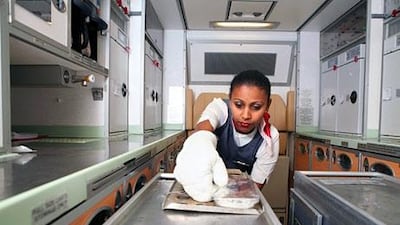has acquired the three main ground handling companies of Abu Dhabi International Airport.
The companies, which handle in-flight catering services, ground handling and cargo operations, are being incorporated, subject to regulatory approvals, into Etihad Airport Services, a unit of Etihad Airways.
It comes as Abu Dhabi Airports Company (
) is predicting a 15 per cent increase in the number of flights over the peak summer period, between May to August, compared with last summer's peak.
Some 1,065 flights a week are expected, with the number of seats available every week predicted to rise 11 per cent on the previous year, to 32,004.
Etihad said yesterday Adac's three companies, Abu Dhabi Airport Services, Abu Dhabi In-Flight Catering, and Abu Dhabi Cargo Company, were being integrated into Etihad's existing organisational structure to maximise synergies and operational scale.
The re-engineered business units will continue to provide the full range of ground handling, catering and cargo services to Etihad and other airlines at Abu Dhabi International Airport, the airline said.
"This acquisition follows international best practice and is critical to the continued growth of the airline, and more importantly to the sustained growth and development of Abu Dhabi's aviation industry in general as envisioned in the Abu Dhabi Plan 2030," said James Hogan, the Etihad president and chief executive.
"The acquisition is a very positive development for the airline, for the three subsidiary companies, and for their employees, who will have access to increased benefits, career enhancement opportunities and training as the organisation continues to grow."
The acquisition will provide significant incremental revenue opportunities, cost savings and operational efficiencies across the various business entities, Mr Hogan added.
During the transition process the airline and Adac said they will work to ensure there is no disruption to existing services as Abu Dhabi airport gears up to handle what it predicts will be its busiest summer.
"The increase in both inbound and outbound flights means Abu Dhabi is not only growing in popularity as a destination for holiday and business travellers, but it's also growing as an international hub for flights connecting to other destinations," said Ahmad Al Haddabi, Adac's chief operating officer. "The airport has already experienced a growth in aircraft movement of 10 per cent so far this year and with the extraordinary number of flights scheduled the trend is set to continue right through the summer."
Etihad will increase flights from 590 to 653 weekly from Abu Dhabi during the coming summer season, while
has grown its operations from 35 to 42 flights from the UAE capital.
Jet Airways has grown from 12 to 21 flights, Air Seychelles from four to 10, Air India Express from 24 to 28, Egypt Air from nine to 11, Turkish Airways from four to six, Nas Air from seven to 19, and Malaysia from one to two.
The new carriers Hainan Airlines, Garuda Indonesia and Rotana Jet will contribute to the increased number of flights through the airport during summer.

